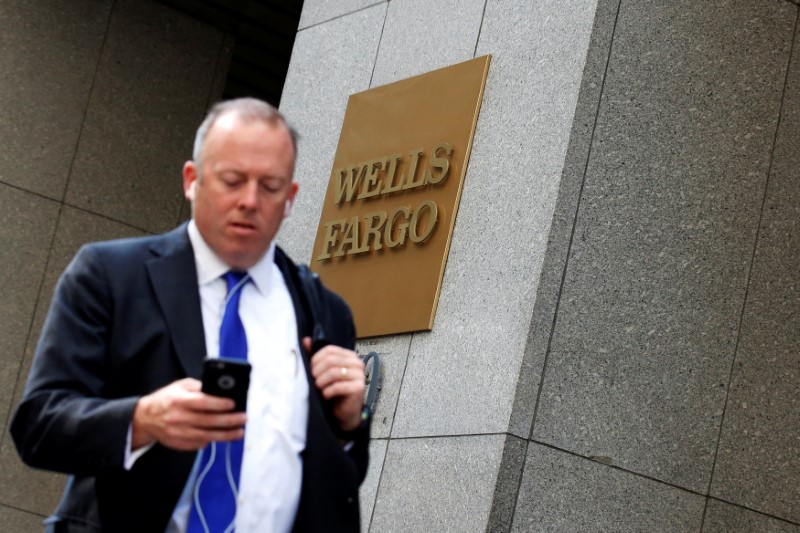(Bloomberg) -- Maybe Tim Sloan was doomed from the start as Wells Fargo (NYSE:WFC) & Co.’s chief executive officer -- a situation summed up by Elizabeth Warren’s reaction to his departure: “About damn time.”
After 2 1/2 years running Wells Fargo, and more than three decades working there, Sloan said this week that his leadership had become a distraction and the best way for the bank to move forward was without him. Chair Betsy Duke said the board will look externally for a new CEO.
Sloan, 58, wasn’t brought down by a new scandal, or by some revelation he was directly involved in Wells Fargo’s past wrongdoing. Instead, his exit followed unyielding criticism from politicians and mounting pressure from regulators. This month, two of the bank’s most important overseers -- the Federal Reserve and Office of the Comptroller of the Currency -- bluntly proclaimed their dissatisfaction, signaling they weren’t about to stop inflicting pain that’s included a cap on the lender’s growth and a $1 billion settlement.
“It seems like it is the culmination of an extraordinarily slow realization by the board that there’s no way that they could turn the corner with Sloan in the leadership position,” said Jeremy Robinson-Leon, president of corporate communications firm Group Gordon. “The fact that Sloan was promoted to the CEO position in 2016 was a blatant unforced error.”
Wells Fargo’s choice for a successor to John Stumpf raised eyebrows from day one. Stumpf was ousted after the revelation that employees had opened millions of potentially fake accounts to meet sales goals. From the board’s perspective, Sloan was the obvious choice for an orderly transition: He had been groomed for the post, serving as finance chief, operating chief and president. None of the nation’s four largest commercial banks has installed an outsider as CEO since they were created in a wave of mergers in the 1990s.
Yet some quickly questioned how a longtime insider could be the right person to clean up the bank. Warren, among others, argued unequivocally that he was not: “His hands are too dirty from overseeing years of scams and scandals,” she said earlier this year.
Ironically, such criticisms only gained steam as Sloan and regulators set out to overhaul the San Francisco-based company, rooting through past complaints and employee testimonials to unearth more scandals across a range of business lines. For critics, every discovery amounted to new evidence that an insider shouldn’t be in charge.
Throughout his tenure as CEO, Sloan and the board tried touting efforts to overhaul Wells Fargo. “You name it, we’ve changed it,” he said last year in an interview with Bloomberg. At times, the bank even noted that his team -- not regulators -- had found a glitch or abuse, fixed it and was already making customers whole. But to the public, the drumbeat of new allegations, probes and fines was just too loud.
At the same time, authorities kept telegraphing that Sloan’s reforms weren’t enough. Wells Fargo has more than a dozen unresolved consent orders with regulators -- meaning that the company hasn’t yet finished fixing internal controls or taking other steps to address lapses or weaknesses. In January, the bank told analysts and investors the Fed’s asset cap would likely stay in place longer than previously expected.
Presence in Washington
Wells Fargo never seemed totally comfortable in the world of Capitol Hill politics, some 2,400 miles away from its headquarters. It viewed itself as simpler than Wall Street behemoths, and under Stumpf even quit the main lobbying association for the largest bank’s CEOs. Its low-key strategy worked for a time, especially during the financial crisis, when Wells Fargo avoided much of the political furor that engulfed the industry. But the bank’s light touch also left it with fewer allies.
Though Wells Fargo revamped its Washington office in 2017 as scandals widened, its presence remained muted. Before Sloan appeared before the House Financial Services Committee this month, one lawmaker who often backs legislative proposals from the financial-services industry and raises money from it, told Bloomberg he was surprised that he had never met anyone from Wells Fargo’s Washington office. He said he knew lobbyists from all other major banks.
The situation came to a head at this month’s hearing, where Sloan spent four hours responding to tough questions from lawmakers in both parties. Even after he calmly described the bank’s commitment to improving, the OCC issued an unusual public rebuke.
“We continue to be disappointed with Wells Fargo Bank N.A.’s performance under our consent orders and its inability to execute effective corporate governance and a successful risk-management program,” the agency said in a statement on March 12.
‘Series of Breakdowns’
The terse statement did more damage to Sloan than hours of criticism from both parties, Capital Alpha Partners analyst Ian Katz wrote in a note to clients this week.
“That was a clear message to the bank’s board that management wasn’t doing its job,” Katz said. “It’s not at all uncommon for lawmakers such as Maxine Waters, the committee chairwoman, to verbally rip into companies and executives. But for the generally bank-friendly OCC to do so on the record is rare indeed.”
A week later, Fed Chairman Jerome Powell reiterated that the central bank won’t lift its asset cap on Wells Fargo until the firm’s problems are addressed. The Fed barred Wells Fargo from growing beyond its size at the end of 2017 until the bank rights its missteps to the regulator’s satisfaction.
“What happened at Wells Fargo really was a remarkably widespread series of breakdowns,” Powell said, noting that, “it’s gone on and on.” It eventually became clear “that these are deep problems that needed to be addressed in a fundamental kind of a way.”
(Updates with description of bank’s lobbying under the subheadline ‘Presence in Washington’.)
